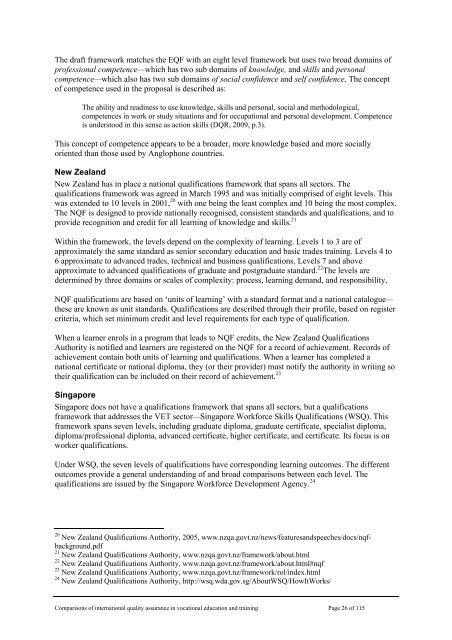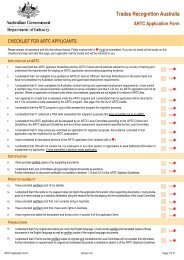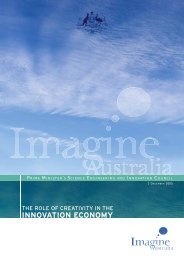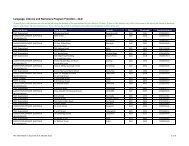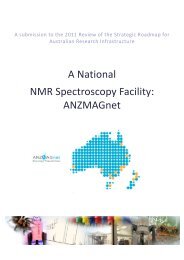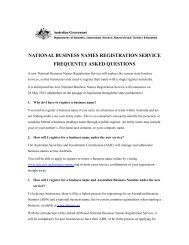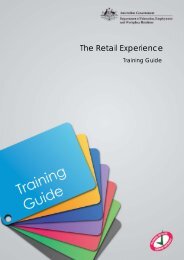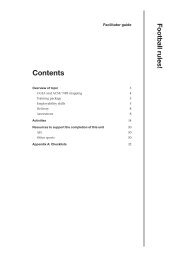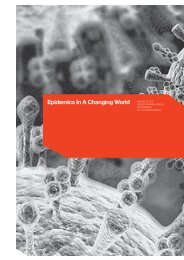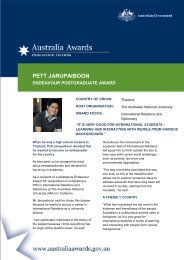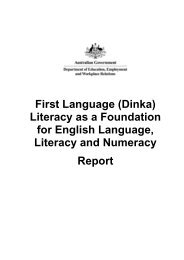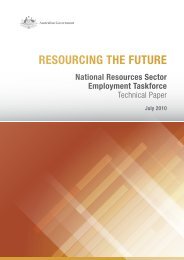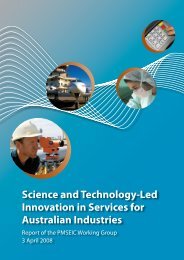Review - Department of Innovation, Industry, Science and Research
Review - Department of Innovation, Industry, Science and Research
Review - Department of Innovation, Industry, Science and Research
You also want an ePaper? Increase the reach of your titles
YUMPU automatically turns print PDFs into web optimized ePapers that Google loves.
The draft framework matches the EQF with an eight level framework but uses two broad domains <strong>of</strong><br />
pr<strong>of</strong>essional competence—which has two sub domains <strong>of</strong> knowledge, <strong>and</strong> skills <strong>and</strong> personal<br />
competence—which also has two sub domains <strong>of</strong> social confidence <strong>and</strong> self confidence. The concept<br />
<strong>of</strong> competence used in the proposal is described as:<br />
The ability <strong>and</strong> readiness to use knowledge, skills <strong>and</strong> personal, social <strong>and</strong> methodological,<br />
competences in work or study situations <strong>and</strong> for occupational <strong>and</strong> personal development. Competence<br />
is understood in this sense as action skills (DQR, 2009, p.3).<br />
This concept <strong>of</strong> competence appears to be a broader, more knowledge based <strong>and</strong> more socially<br />
oriented than those used by Anglophone countries.<br />
New Zeal<strong>and</strong><br />
New Zeal<strong>and</strong> has in place a national qualifications framework that spans all sectors. The<br />
qualifications framework was agreed in March 1995 <strong>and</strong> was initially comprised <strong>of</strong> eight levels. This<br />
was extended to 10 levels in 2001, 20 with one being the least complex <strong>and</strong> 10 being the most complex.<br />
The NQF is designed to provide nationally recognised, consistent st<strong>and</strong>ards <strong>and</strong> qualifications, <strong>and</strong> to<br />
provide recognition <strong>and</strong> credit for all learning <strong>of</strong> knowledge <strong>and</strong> skills. 21<br />
Within the framework, the levels depend on the complexity <strong>of</strong> learning. Levels 1 to 3 are <strong>of</strong><br />
approximately the same st<strong>and</strong>ard as senior secondary education <strong>and</strong> basic trades training. Levels 4 to<br />
6 approximate to advanced trades, technical <strong>and</strong> business qualifications. Levels 7 <strong>and</strong> above<br />
approximate to advanced qualifications <strong>of</strong> graduate <strong>and</strong> postgraduate st<strong>and</strong>ard. 22 The levels are<br />
determined by three domains or scales <strong>of</strong> complexity: process, learning dem<strong>and</strong>, <strong>and</strong> responsibility.<br />
NQF qualifications are based on ‘units <strong>of</strong> learning’ with a st<strong>and</strong>ard format <strong>and</strong> a national catalogue—<br />
these are known as unit st<strong>and</strong>ards. Qualifications are described through their pr<strong>of</strong>ile, based on register<br />
criteria, which set minimum credit <strong>and</strong> level requirements for each type <strong>of</strong> qualification.<br />
When a learner enrols in a program that leads to NQF credits, the New Zeal<strong>and</strong> Qualifications<br />
Authority is notified <strong>and</strong> learners are registered on the NQF for a record <strong>of</strong> achievement. Records <strong>of</strong><br />
achievement contain both units <strong>of</strong> learning <strong>and</strong> qualifications. When a learner has completed a<br />
national certificate or national diploma, they (or their provider) must notify the authority in writing so<br />
their qualification can be included on their record <strong>of</strong> achievement. 23<br />
Singapore<br />
Singapore does not have a qualifications framework that spans all sectors, but a qualifications<br />
framework that addresses the VET sector—Singapore Workforce Skills Qualifications (WSQ). This<br />
framework spans seven levels, including graduate diploma, graduate certificate, specialist diploma,<br />
diploma/pr<strong>of</strong>essional diploma, advanced certificate, higher certificate, <strong>and</strong> certificate. Its focus is on<br />
worker qualifications.<br />
Under WSQ, the seven levels <strong>of</strong> qualifications have corresponding learning outcomes. The different<br />
outcomes provide a general underst<strong>and</strong>ing <strong>of</strong> <strong>and</strong> broad comparisons between each level. The<br />
qualifications are issued by the Singapore Workforce Development Agency. 24<br />
20 New Zeal<strong>and</strong> Qualifications Authority, 2005, www.nzqa.govt.nz/news/features<strong>and</strong>speeches/docs/nqfbackground.pdf<br />
21 New Zeal<strong>and</strong> Qualifications Authority, www.nzqa.govt.nz/framework/about.html<br />
22 New Zeal<strong>and</strong> Qualifications Authority, www.nzqa.govt.nz/framework/about.html#nqf<br />
23 New Zeal<strong>and</strong> Qualifications Authority, www.nzqa.govt.nz/framework/rol/index.html<br />
24 New Zeal<strong>and</strong> Qualifications Authority, http://wsq.wda.gov.sg/AboutWSQ/HowItWorks/<br />
Comparisons <strong>of</strong> international quality assurance in vocational education <strong>and</strong> training Page 26 <strong>of</strong> 115


